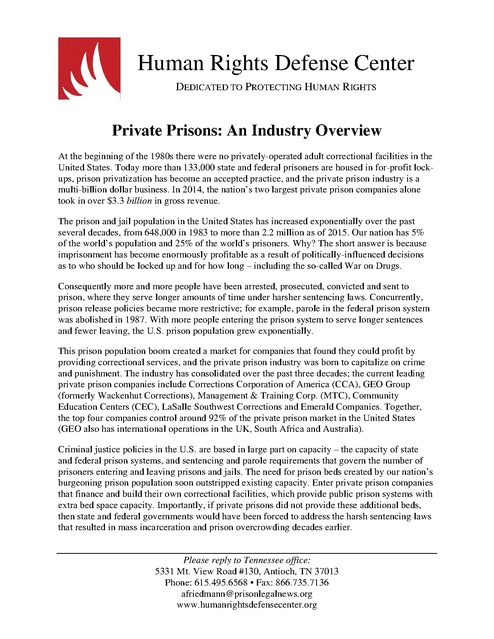HRDC Private prison fact sheet - Industry Overview 2015
Download original document:

Document text

Document text
This text is machine-read, and may contain errors. Check the original document to verify accuracy.
Human Rights Defense Center DEDICATED TO PROTECTING HUMAN RIGHTS Private Prisons: An Industry Overview At the beginning of the 1980s there were no privately-operated adult correctional facilities in the United States. Today more than 133,000 state and federal prisoners are housed in for-profit lockups, prison privatization has become an accepted practice, and the private prison industry is a multi-billion dollar business. In 2014, the nation’s two largest private prison companies alone took in over $3.3 billion in gross revenue. The prison and jail population in the United States has increased exponentially over the past several decades, from 648,000 in 1983 to more than 2.2 million as of 2015. Our nation has 5% of the world’s population and 25% of the world’s prisoners. Why? The short answer is because imprisonment has become enormously profitable as a result of politically-influenced decisions as to who should be locked up and for how long – including the so-called War on Drugs. Consequently more and more people have been arrested, prosecuted, convicted and sent to prison, where they serve longer amounts of time under harsher sentencing laws. Concurrently, prison release policies became more restrictive; for example, parole in the federal prison system was abolished in 1987. With more people entering the prison system to serve longer sentences and fewer leaving, the U.S. prison population grew exponentially. This prison population boom created a market for companies that found they could profit by providing correctional services, and the private prison industry was born to capitalize on crime and punishment. The industry has consolidated over the past three decades; the current leading private prison companies include Corrections Corporation of America (CCA), GEO Group (formerly Wackenhut Corrections), Management & Training Corp. (MTC), Community Education Centers (CEC), LaSalle Southwest Corrections and Emerald Companies. Together, the top four companies control around 92% of the private prison market in the United States (GEO also has international operations in the UK, South Africa and Australia). Criminal justice policies in the U.S. are based in large part on capacity – the capacity of state and federal prison systems, and sentencing and parole requirements that govern the number of prisoners entering and leaving prisons and jails. The need for prison beds created by our nation’s burgeoning prison population soon outstripped existing capacity. Enter private prison companies that finance and build their own correctional facilities, which provide public prison systems with extra bed space capacity. Importantly, if private prisons did not provide these additional beds, then state and federal governments would have been forced to address the harsh sentencing laws that resulted in mass incarceration and prison overcrowding decades earlier. Please reply to Tennessee office: 5331 Mt. View Road #130, Antioch, TN 37013 Phone: 615.495.6568 • Fax: 866.735.7136 afriedmann@prisonlegalnews.org www.humanrightsdefensecenter.org While private prisons house only around 9% of state and federal prisoners, it is an important 9%. As of the end of 2013, private prisons were utilized by the federal government and 24 states, of which some have become dependent on privatization to maintain their prison population levels. Seven states have 20% or more of their prisoners in for-profit facilities, including New Mexico (43.6%), Montana (40.1%) and Hawaii (25.2%). The federal Bureau of Prisons houses 19% of its population in private prisons. By leveraging a relatively small number of beds nationwide, the private prison industry has managed to forestall much-needed criminal justice reform to address the problems of overincarceration and overcrowding in the U.S. prison system. Some problematic issues involving the private prison industry include: A corrupting influence on the criminal justice system by lobbying and making campaign contributions to politicians in order in influence criminal justice policy and benefit forprofit prison companies. Multiple studies have found that prisoners released from privately-operated facilities have higher average recidivism rates than those released from public facilities. There is a lack of transparency in private prisons, as they are usually not subject to public records laws and are exempt from the Freedom of Information Act on the federal level. Due to the business model of the private prison industry, which includes cutting staffing costs and understaffing, there are higher levels of violence in private prisons. Violence, riots and other problems exist in public prisons, too – but the frequency and severity of such incidents in private prisons imply that such facilities are more prone to unrest and instability as a direct result of how private prisons cut costs to generate profit. Private prison firms have a for-profit incentive to increase the number of people who are incarcerated and the length of time they serve, contrary to public interests. While private prison companies claim they can save money, there is equivocal research in that regard and some studies have found private prisons are actually more expensive. For example, while CCA made $195 million in net income in 2014, that was corporate profit and none of that money represented any “savings” to taxpayers. From a principled standpoint, it is immoral and unethical to incarcerate people for the purpose of generating corporate profit. This is why at least 5 religious denominations have formally opposed for-profit private prisons. Perhaps the most deleterious effect of the private prison industry is that it has successfully legitimized the concept of for-profit incarceration. While people might question the notion of a privatized police force that benefits financially when people are arrested, allowing companies to profit from people’s imprisonment has become an accepted and normalized part of our nation’s criminal justice system. This has created an insidious industry based on the concept that justice literally is for sale and crime does in fact pay – if you own stock in private prisons, that is.





